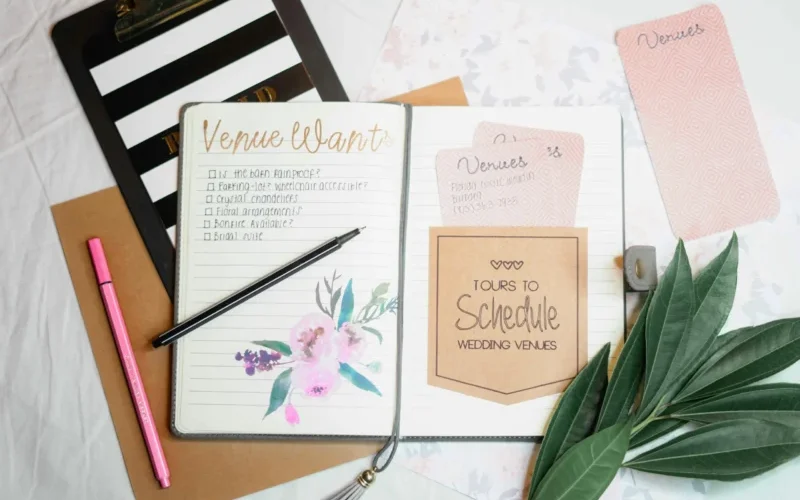Introduction to Wedding Planning
Wedding planning entails a meticulously organized process that transforms an idea into a significant life event. It encompasses various elements, including budgeting, venue selection, catering, guest management, decor, and scheduling, among others. For many couples, this journey is both thrilling and, at times, overwhelming. As the celebration approaches, the magnitude of responsibilities and decisions can lead to increased stress. The unique challenges encountered during wedding preparation can vary widely, influenced by factors such as the couple’s preferences, cultural traditions, and the scale of the event.
The initial phase of wedding planning typically involves articulating a vision for the ceremony and reception. Couples must consider their priorities, such as whether they prefer an intimate gathering or a grand celebration. Moreover, the financial component serves as a critical aspect, with different allocations deciding the extent of services and options available. As decisions cascade, balancing personal desires with practical constraints can prove challenging, and couples often find themselves dealing with negotiations with vendors, timelines, and guest lists.
In tandem with these considerations, couples may also wish to navigate familial expectations, which can vary significantly depending on cultural backgrounds or traditional practices. This adds another layer to the planning experience, as balancing different perspectives can feel daunting. Thus, for many, the question of hiring a wedding planner arises. A professional planner can alleviate the burdens of logistics and coordination, allowing couples to focus on their relationship and the joy of their upcoming union. This article aims to explore the benefits and considerations of hiring a wedding planner, helping couples make informed choices in their wedding planning journey.
The Benefits of Hiring a Wedding Planner
Engaging a wedding planner can significantly elevate the wedding planning experience, offering a range of benefits that enhance both the process and the resulting event. One of the primary advantages is the wedding planner’s industry expertise. With extensive knowledge of vendors, venues, and local regulations, these professionals can assist couples in navigating the complexities of organizing a wedding. Their established relationships with providers often translate into favorable deals and can help secure services that may otherwise be out of reach.
In addition to their industry insights, wedding planners excel in negotiation skills. This proficiency not only ensures that couples receive the best value possible but also alleviates the stress associated with dealing with multiple vendors. For example, a planner can handle contract discussions and payment schedules, allowing couples to focus on their engagement rather than on logistics. Furthermore, their experience in managing budgets can prevent overspending, helping couples adhere to their financial plans.
Time-saving capabilities are another crucial benefit of hiring a wedding planner. Planning a wedding often demands overwhelming amounts of time, particularly for busy couples balancing careers and personal commitments. A planner effectively coordinates timelines, creating a structured plan that allows couples to enjoy the journey without feeling rushed. Instead of getting bogged down by details, couples can concentrate on selecting meaningful elements that reflect their personalities.
Lastly, the emotional support provided by a wedding planner cannot be understated. A wedding can be a stressful time, and having a professional to rely on for guidance and reassurance is invaluable. Whether it is advice on design choices or logistics, a wedding planner acts as a trusted partner throughout the process, ensuring that the couple’s vision is brought to life while minimizing any potential anxieties. These benefits collectively illustrate why hiring a wedding planner can enhance the overall wedding experience, making it a worthwhile investment for many couples.
Common Myths About Wedding Planners
When considering hiring a wedding planner, it is important to address and dispel several common myths surrounding their role and services. One prevalent misconception is that wedding planners are only necessary for couples with a large budget. In reality, planners can cater to various financial situations. Their expertise allows them to provide guidance and support that can save money in the long run by identifying cost-effective solutions and negotiating vendor contracts. Regardless of the overall budget, a professional wedding planner can add value through their industry knowledge and planning efficiencies.
Another myth is that engaging a wedding planner means relinquishing control over the wedding details. Conversely, a wedding planner can enhance a couple’s vision rather than diminish it. Their role is to collaborate with the couple to ensure their personal touches and preferences remain central to the planning process. Planners excel in managing the logistics, handling conflicts, and alleviating stress, enabling couples to concentrate on the elements that truly matter to them.
Furthermore, some believe that hiring a planner is synonymous with cookie-cutter weddings. This is far from the truth, as wedding planners specialize in creating unique and personalized events. They have access to a diverse range of resources and vendors, enabling them to bring a couple’s distinct style and theme to life. Whether a couple envisions a traditional ceremony or a modern celebration, a skilled wedding planner can tailor their services accordingly.
In addressing these myths, it becomes evident that wedding planners serve a valuable role in the planning process, regardless of budget or personal style. Their expertise not only enhances the overall experience but also ensures a seamless execution of the wedding day. Understanding these facts can help couples make informed decisions about hiring a wedding planner to support their journey.
When to Consider Hiring a Wedding Planner
Deciding whether to hire a wedding planner can significantly influence the planning process and overall experience of your special day. Several indicators suggest that employing a professional wedding planner may be in your best interest. One of the primary factors to consider is the size and complexity of the wedding. Large events, especially those with multiple vendors, intricate timelines, or diverse elements, can become overwhelming without professional guidance. A wedding planner possesses the expertise to navigate these complexities smoothly, ensuring that all components are seamlessly integrated.
Another critical aspect to evaluate is the couple’s availability and experience with event planning. If both partners maintain demanding jobs or other commitments that hinder their ability to dedicate adequate time to wedding preparations, engaging a wedding planner could relieve considerable stress. Furthermore, couples with little to no experience in planning events may find themselves quickly overwhelmed or uncertain about where to begin. A seasoned planner can provide the necessary structure and direction, helping couples avoid common pitfalls.
Personal preferences and stress levels also play a significant role in this decision. If the thought of organizing a wedding feels burdensome, a professional wedding planner can assist in mitigating that stress by taking charge of logistics and decision-making. Furthermore, if disagreements arise between partners regarding planning responsibilities, utilizing a wedding planner can provide an impartial mediator who can facilitate discussions and keep the planning process fluid.
In situations where budget constraints exist, couples may initially hesitate to hire a planner. However, it is essential to recognize that wedding planners can often provide insights into budget management and vendor negotiations that could ultimately save money. Assessing these factors thoughtfully will lead to an informed decision that aligns with the couple’s overall vision for their wedding day.
How to Choose the Right Wedding Planner
Selecting the right wedding planner is a pivotal decision for any couple. It involves careful consideration of numerous factors to ensure the planner aligns with your vision for the big day. One of the initial steps in this process is checking the planner’s credentials. It is essential to verify their qualifications, experience level, and professional affiliations. A reputable planner often has certifications from recognized wedding planning organizations, which indicates a serious commitment to the profession.
Another important aspect is reviewing portfolios. A well-organized and visually appealing portfolio can provide insight into the planner’s style, creativity, and the types of weddings they have executed in the past. Look for variety in their portfolio; a diverse range of themes and settings can demonstrate their adaptability to different preferences and budgets. Additionally, past client testimonials can offer an authentic glimpse into the planner’s ability to manage stress and unexpected challenges during the planning process.
Understanding different planning styles is also vital. Wedding planners may specialize in various types of ceremonies ranging from intimate gatherings to lavish celebrations. Identifying your own wedding style and needs can help narrow the search. Consider whether you want a planner who is hands-off, allowing you freedom to make choices, or one who is more hands-on, guiding you through every step.
Finally, interviewing potential planners is crucial. Prepare a set of questions that align with your priorities, such as their approach to budgeting, vendor relationships, and conflict resolution. This dialogue not only helps gauge their expertise but also their compatibility with you as a couple. Hiring a wedding planner necessitates a shared vision; thus, establishing rapport during the interview process can significantly impact your wedding’s success.
The Cost of Hiring a Wedding Planner
Hiring a wedding planner can significantly influence the overall budget of your wedding, which is a primary concern for many couples. Typically, the cost of hiring a wedding planner varies based on several factors, including their experience level, the complexity of the wedding, and the geographical location. On average, couples can expect to pay between 10% to 20% of their total wedding budget for a planner’s services. This percentage encompasses a range of services from full planning, partial assistance, to day-of coordinating.
Several elements can affect the pricing structure of a wedding planner. For instance, planners with extensive experience or specialization in certain wedding types may charge higher fees. Additionally, if your wedding involves unique elements or is hosted at a location that necessitates extra logistics, these factors can also add to the cost. It’s crucial to engage in an upfront conversation with potential planners about their fees, as many may offer customizable packages to suit different budgetary needs.
Interestingly, while the initial investment in a wedding planner may seem substantial, it can yield financial benefits in the long run. Professional wedding planners harness their industry knowledge and vendor relationships to negotiate better prices on behalf of their clients. Their familiarity with typical wedding costs can help avoid overspending on elements that might not provide value. Moreover, wedding planners are adept at identifying potential pitfalls and costly mistakes—such as overbooking venues or misallocating funds during the planning process—that can detrimentally impact a couple’s budget.
In essence, while hiring a wedding planner involves an upfront cost, the expertise and value they provide often translate into effective budget management and peace of mind, ultimately saving couples money while ensuring a memorable wedding experience.
Alternatives to Hiring a Wedding Planner
While hiring a wedding planner can ease the stress of coordinating a wedding, couples may explore various alternatives that can also prove effective. One increasingly popular option is the use of wedding planning apps. These digital tools provide organized checklists, vendor recommendations, and budgeting features that can help couples stay on track throughout the planning process. Many apps offer user-friendly interfaces and customizable templates, making them a practical choice for those who prefer a hands-on approach. However, it is important to recognize that while these apps can simplify tasks, they lack the personalized guidance that a professional wedding planner can offer.
Another alternative is DIY wedding planning, where couples take full responsibility for coordinating their special day. This approach allows for complete creative freedom and can be a meaningful way for couples to infuse their personalities into the wedding. However, it is critical to evaluate the time and effort required for this option. Organizing a wedding involves myriad details, and managing these effectively can quickly become overwhelming, particularly for couples with demanding schedules. Moreover, without industry experience, unanticipated challenges may arise, adding to the stress of the planning process.
Couples may also consider enlisting the help of friends or family members in lieu of hiring a professional. Friends with experience in event planning or relatives who have recently organized weddings can offer valuable insights and support. This approach fosters collaboration and can even deepen relationships through shared experiences. However, this arrangement may strain friendships if the tasks become burdensome or if differing opinions arise on planning decisions. Ultimately, it is essential for couples to weigh the benefits and drawbacks of these alternatives to make an informed decision that aligns with their vision and circumstances.
Real-Life Experiences: Couples Who Hired Planners vs. Those Who Didn’t
Wedding planning can be a complex and emotionally charged process, and the experiences of couples who opted for hiring a wedding planner versus those who undertook the planning independently often vary significantly. One couple, Sarah and James, shared their journey of hiring a professional planner. They expressed that while the decision initially felt like an additional expense, the time saved and the reduced stress were invaluable. The planner helped them negotiate contracts, recommend quality vendors, and ensured their vision was executed perfectly on the big day. Sarah remarked, “We realized that we could actually enjoy our wedding rather than worry about all the little details.” Their experience illustrated how hiring a planner can alleviate the burden and complexity of coordinating numerous elements.
Conversely, another couple, Emma and Luke, decided to plan their wedding without professional assistance. They were driven by a desire to personalize every detail and save costs. However, their journey was not without challenges. Emma noted, “We quickly learned that organizing everything alone was overwhelming. Juggling vendor meetings alongside our full-time jobs left us exhausted.” They encountered difficulties in vendor selection, budgeting, and scheduling, which led to a series of last-minute changes and stress as their wedding day approached. Their experience serves as a testament to how wedding planning can become chaotic without expert guidance.
A third couple, Mia and Oliver, had a mixed experience; they initially hired a planner who was unable to understand their vision. After terminating the service, they took on the planning themselves. Despite feeling liberated by their newfound control, they also faced moments of uncertainty outside their expertise. Mia reflected, “It was a whirlwind, and while we succeeded in filtering our creative aesthetic, we learned that certain tasks, like vendor negotiations, are best left to professionals.” Their dual experience highlights that the effectiveness of hiring a wedding planner can greatly depend on the quality of communication and the planner-client relationship.
These real-life anecdotes during the wedding planning process demonstrate the diverse experiences couples face, whether they decide to hire planners or manage everything independently. Each choice bears its set of rewards and challenges, significantly impacting the overall wedding experience.
Conclusion: Making the Decision for Your Wedding
Deciding whether to hire a wedding planner is a significant choice that requires careful consideration of various factors. The decision ultimately hinges on the couple’s individual needs, preferences, and wedding aspirations. Throughout this guide, we’ve discussed the advantages of employing a wedding planner, such as their expertise in managing logistics, vendor coordination, and creative design. These professionals can alleviate the stress associated with planning, allowing couples to focus on enjoying their engagement and the planning process itself.
On the other hand, some couples may feel comfortable managing their wedding arrangements independently, particularly if they have strong organizational skills or a limited budget. DIY planning can offer a sense of control and personal involvement that many couples cherish. However, it may also lead to unanticipated challenges, given the sheer complexity involved in orchestrating a successful event. Couples should thoughtfully evaluate their comfort levels and available resources before making this crucial decision.
When weighing the pros and cons of hiring a wedding planner, couples should reflect on aspects such as the size and style of their wedding, their timeline, and their budget. Consideration of personal priorities can help clarify whether professional assistance would enhance their overall experience. For instance, those who prioritize seamless execution and unique creativity may benefit significantly from enlisting a planner’s services. In contrast, couples seeking a more hands-on approach might find that coordinating their wedding fosters a deeper connection to the process.
Ultimately, the decision to hire a wedding planner should align with the couple’s vision for their special day. By understanding the implications and benefits, couples can make informed choices that resonate with their personal values and expectations for their wedding celebration.







